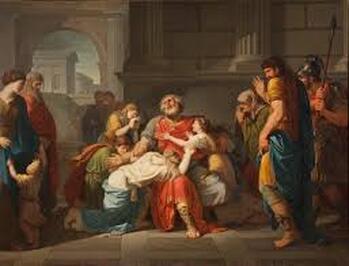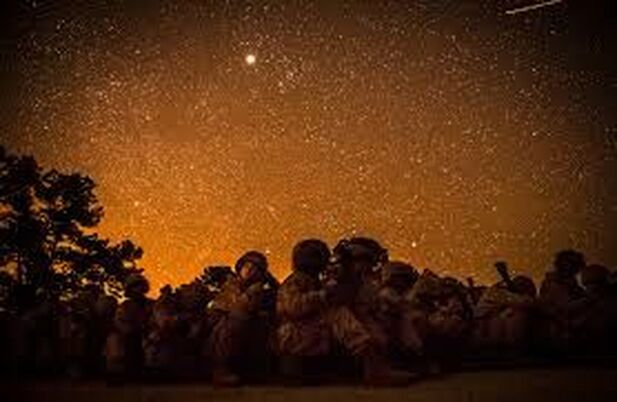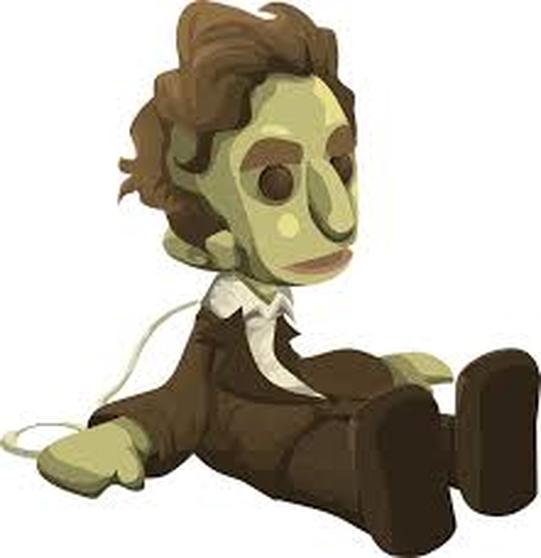|
I try to take a dip every night in the summer to cool down and improve my flexibility. My joints are seizing up on me and moving around in the water helps a bit. Tonight, I was looking at a planet directly south of me and a light plane flew between me and the planet. My first thought was that there were people in the plane, and it was way up high in the sky. Then I thought about the planet and how it was really there too, much further out, but there. My friends and I used to sleep out in the summers, and back then, before the prison was built, there was much less light to obstruct our vision of the Milky Way. It was a spectacular sight back then; we would lay on our backs on spread out blankets, stare at the sky, and talk about the magic of it all. One night, very early in the morning hours, a huge fireball the size of a basketball roared across sky above us. We could actually hear a sizzling type of sound as it passed. It spooked us all. My little brother got scared and ran through the small bunch of trees that separated our house from the Miranda's backyard and went in the back door of our house. I followed about hour later. It was spooky but also one of the most spectacular things I have ever seen. It is hard to say when we all got too old to sleep outside. I know it was in the late 60s because on one of those last occasions, a Fresno radio station played Quicksilver Messenger Service's Pride of Man. We lay on our backs looking up at the stars and listened to John Cippolina play that wobbly guitar solo. I love that solo and I loved that dude and was sad for days when he died. It wasn't long after that night that the 60s began for us in earnest and most of the star gazing and sleep outs stopped abruptly. During the early years of my marriage, we would make a habit of spending a weekend in the mountains a couple times a year with our friends. Up high above the valley there was a hell of a lot less light and night sky would be so filled with diamonds and pieces of diamonds that it would overwhelm a person to see it. Like most everyone else, nowadays I spend more times looking at small screens than night skies, and it shows.  When my friends and I got old enough to drive, our vision was usually focused straight ahead. We slid through the darkness with eyes transfixed on the sights revealed in our headlights. The headlamps were like an extension of our eyes, constantly searching for something. Sometimes there was actually something out there, but more often, not. Once, a friend, his girlfriend, and I watched a road northeast of town breathing. He and I got out of the car to try and jump on it like kids in a bounce house. It wasn't as fun as we thought it would be, mainly because the road wasn't really breathing. Our headlights got it wrong that time. His girlfriend sat in the car and laughed at our silly efforts. We kept trying to get a bounce out of the road and would give each other advice on how to make it happen. Grand Funk Railroad was on the stereo playing their sublime version of the Stone's Gimme Shelter; I remember it well because it was my tape. It was a very interesting night and that's really all we were after. There was rarely any real destination where we were going. The plan was to find some female companionship and just go and see where the road took us. The only map we had was in our head and cardinal points were here, there, there, and there. The direction we were heading was forward. And the road would let us know where we were going once we got there. Sometimes there was so much smoke inside the car it was like driving through a fog. We never got anywhere, but it wasn't for a lack of trying. There was always a deeply seated urge to not sit still. Kerouac explained it to us in that book, and we recognized what he was talking about. Sitting still was so nowhere. Moving was where it was at. One night, we ended up in Delano looking for a friend's brother. We drove all night listening to one song, Tommy James and the Shondell's Crimson and Clover. The next day, we didn't even care to ask each other why that one song lasted the whole fucking night. On other nights, we would end up drinking on the outskirts of town, parked on ditch bank and fishing out cold beer from a styrofoam ice chest while sitting on the back of the car and discussing the future in vague terms. Occasionally, a song would come on the radio, and it was always the one who was pissing in the ditch who would turn and scream, "Turn that shit up, Man!" Many people believed that the Sixties died with the murder of the Labiancas at 3301 Waverly Drive by the Manson family and that the nail of the coffin was driven in by the Rolling Stone's disastrous Altamont concert. For me, the era ended when one of my roommate's got busted for selling weed to an undercover officer, and my coffin nail was a girl who I liked a lot telling me she didn't like me nearly as much as she had led me to believe. I moved back home to my parent's house and parked my car for some reason. One night I was walking home south on Estes looking up at a big full moon and feeling about as sad as a young man could possibly feel; I stopped beneath a streetlight to stare up at the moon for a moment; it really was a glorious sight, but I felt like I was dragging my feet instead of walking, and my poor heart felt like a small sack of cement that I was carrying around for the hell of it.  "I don't know if I could ever poke out my own eyes or not. I like seeing strange shit way too much, even if it's bad for me. " I don't why people don't notice the heavens as much as we should. We exist right smack in the middle of the infinite sky and a wet spot on a microscope slide. For some strange ass reason we only seem to notice what is directly in front of our faces. It could have something to do with the arrangement of our eyes I guess. It's like the old saying, "I don't know; I don't have eyes in back of my head."
I guess it's a big improvement from our cave man days when our posture was twisted and our eyes always focused on the ground to search out snakes and other disreputable reptiles. In the Bible account, God placed the fruit from the tree of life in the Garden; it might have been just to get Adam to quit staring at his feet so much. In the great play by Sophocles, Oedipus pokes out his own eyes when he discovers the truth about his existence and after he sees the barrenness and the blight upon the land that his actions had unknowingly caused. In his blindness, he turns his vision inward and thereafter becomes something of a saint. It's a metaphor for life, and one that warns us humans that we seriously need to get with it when it comes to searching out things. Everything on the outside is never what it seems to be and our insistence on checking it out thoroughly is leading us astray, instead we need get down on our hands and knees in front of our cars at night and let the light from our headlights reveal something about what's really going on inside of us. I don't know if I could ever poke out my own eyes or not. I like seeing strange shit way too much, even if it's bad for me. For example, I've watched several of Quentin Tarantino movies, and I have no great love for him. His movies, in my eyes, are exactly the problem that we humans have with existence: Life is boring enough without visual effects and introspection is just too damn hard for most of us. I am going to work on it though. I am going to get off all of my devices one of these nights, go outside, sit in the pool, sip on a scotch and water, and look upward and try to find some real magical shit. "Joy at the start Fear in the journey Joy in the coming home A part of the heart Gets lost in the learning Somewhere along the road" Dan Fogelberg Road 36 that leads east and then north out of Corcoran is dangerous for dogs. I know this because of the two dead canines I've seen lying moldering on the side of the road within a few hundred yards of each other, forgotten pets whose only value now is to remind those who pass by of both the transitory nature of existence and the lethal character of four wheel vehicles moving at high speeds. I've also seen a dead skunk right before Corcoran Cemetery on the road that turns into Road 36 and another dog where 198 leads into Visalia. So maybe I should say the road to Visalia is rough on animals in general. There is also dead possum about a mile south of where 36 meets highway 198. It is located after you cross through the intersection of 232 and 36, a place where I was rear ended at a stop sign a few weeks ago. One of my dad's family nicknames was Possum. I like to think that the possum was placed there for that reason, to remind me of my father, who use to hunt possums when he was young. Lot of people would think that this is weird thinking, but not me. I think of my dad every time I see that tiny dead possum curled up on the side of the road, so why would it be weird? The possum is dead and my dad is also dead. My dad was called Possum and the possum was too. One night I was home watching TV and a classic GEICO commercial comes on telling the story of a man who gave his children a possum instead of a puppy or cat, and the possum played dead. The possum playing dead in the ad was a spitting image of the possum on the side of the road leading me to think that the ad just happened to show up at that moment to, wait for it . . . . remind me of my dad. Maybe, it was there to remind me that my dad may be actually playing possum too. He would certainly know a thing or two about their wily ways having hunted them as a youth. I don't know, those kinds of questions are above my pay grade. I would have to be paid a lot more than I am to think about that stuff all of the time. I do a lot of volunteer work in that regard, but I also have other things to do. I have come to regard the intersection of 132 and 36 about a mile north of Preet's Market as the crossing into the other world, the subconscious one. This type of crossing can actually be anywhere as we carry it around on the inside of us. Most of us cross over and back several times a day. It is actually the natural order of all things as we constantly conceive of a thing in our minds and then turn into some kind of reality. It is also manifested in the structure of our brain with its two hemispheres, one side trying to grasp the big picture and the other trying to analyze the smallest detail. The corpus callosum is the road that bisects the hemispheres, the interface if you will. The interface is very important as it enables the two halves to function together as one. I have crossed over the line in a big way about three times in life and each time it was a life-changing event. The first time I was working for Boswell Co. digging ditches with a dragline. It was tedious work and to help time pass I would read something then contemplate about what I had read while I swinging back and forth scooping up and then emptying buckets of dirt. That particular day I had read a short passage about Moses and the Red Sea. It said something like the sea parted when Moses and the Hebrews took their first steps forward. I don't know how Biblically correct that is, but I suddenly felt my body tingling as I understood to the very fiber of my being what that meant. It affected me greatly; I have never felt anything near it in intensity. I decided at that exact moment that I would go back to school and become a teacher. That step forward represents the will to change. Will is everything in life. My life choices up to that point had brought me to the lowest part of the valley digging dirt because crap as the old saying goes, "flows downhill." I had ceased to do things that would change my life for the better. I have discovered that another factor in such moments was that you usually are feeling down, depressed, curious or conflicted as being in such states sometimes weakens the wall between this world and the other. It has also been documented such moments have a way of occurring when the emotional state of the recipients are in very low condition or are thinking intently about a problem. St. Paul's experience on the road to Damascus would be an example. The French scientist Rene Descartes brought the modern world into existence after a series of three dreams that were, "preceded by a state of intense concentration and agitation." There are many other examples. The last time I had such an epiphany, I was driving north on 99 on my way to Fresno. My oldest daughter was contemplating moving to Portland as she was unhappy being in Fresno. I didn't know what to tell her; I didn't want her to live so far away, but I didn't want to chain her to Corcoran, the way my father's fears had done to me. I had just left Corcoran and a couple minutes down the road, I had what can only be described as a brain rush. There was a feeling of energy surging through my body as before, and I knew answers to questions that I hadn't even asked. I knew the exact words to tell my daughter, "Don't move to Portland if you are going to take Fresno with you," meaning that her problems were not just going to go away because of a change of address. I knew that this understanding was coming from somewhere else, somewhere deeper inside of me where I rarely go. The thing is it changed me. It led me to discover the secret of great literature and the true meaning of fiction, I understood the huge mistake that has led to modern culture, and the roots of the problem of our educational system. By saying I knew, I don't mean I could explain it that well in empirical terminology, it was a sense of certainty, a type of knowledge that carries a burden that puts you on a path that you must travel from then on, uncovering even more secrets along the way It marks you as something of a know-it-all that people tend to avoid. This may have been my purpose to begin with as I can remember some kids didn't like playing with me because I had a knack for taking over and stage managing our play and making it relate to whatever what I was reading at the time. We didn't just play army, we played 300 Spartans. I didn't try to impose things, I just let it out that it was more interesting resisting the tyranny of the Persian Empire than running around with sticks shouting bang, bang. Looking back, I realize it was the reading. My imagination was a bit wider and deeper because I read a lot. I have never pretended to be any smarter or better than anyone else; I just read, and when you stuff a lot of words, images, ideas, and visions into the small space occupied by your brain, they have tendency to mingle with other words, thoughts, and ideas and then try to leak back out through your mouth. Maybe sometimes, many words and ideas come crashing together with such great force they come rushing out into your consciousness with the power of a lightning bolt, something like that satisfying little rush that is so addicting in the video game Candy Crush. I have learned that a long time ago people knew a lot more about lines and angles and numbers. Geometry was not just used to measure things the way that we us it now. It was also a system for the metaphysical understanding of existence. It was the same with numbers. Pythagoras didn't just teach counting, adding, subtracting, multiplying, and division. He used math to teach the mysteries of life. Take, for example, the number one. It is the number that reminds us that all things are actually only one thing. In the old days, they used to think about what that wholeness meant. Nowadays only a few think like that, as most people think of one dollar, one car, first downs, or number one on the charts. The number two is a number that expresses differentiation of something that shouldn't really exist being that all things are really one thing. It is the same with nouns in grammar. They denote difference like the number two says rather stridently, "I exist, I am different." There is a ton of hidden meaning to be found in the relationship between the number one and the number two. Sadly, we have neglected the mystery of the number two in favor of its ability to divide, as in gender, politics, race, and religion. Three however is the most mysterious number of them all. When there are two things, a third magically appears. It is the interface between the two. Like I said, the corpus callosum makes the brain function efficiently. It is the mystery of how things work; it is the surface of a lake, the present between the old and the new, the period just before the sun rises above the horizon. It is the missing middle in American politics, and the middle ground that would help our schools function far better than they do today. Our ancient ancestors knew this information, studied it, and put it forward in their myths. They knew that an intersection of lines represents something far more than a mere road crossing. I found this knowledge hidden in a lot of the stories that I read and I taught. There is a reason that in the young adult novel Tuck Everlasting, the wizened Angus Tuck takes Winnie Foster out on the lake to talk about the meaning of life. There is also reason for the strange forest containing the magical water being next door to her house. Crossing the distance between her house and the forest is the same as the act of will I mentioned in the story of Moses and the Red Sea. The interface is important, maybe the most important thing of all. It is not all that strange that I can see an intersection like Road 36 and Road 232 as being a place full of magic. Behind me at that intersection is the known world that I have inhabited for all 66 years of my existence, a world of lines, angles, people, history and buildings. Before me though is the mysterious future, the hope, the dreams, the unknown world where I seek to find something new before I end up residing for eternity in Corcoran Cemetery on the side of the road leading east and north out of town. Gone and soon forgotten, useless except as a reminder to those who drive by of both the transitory nature of life and the danger of fast moving vehicles. In the meantime, give your pets a heads up. The audience roared. They always did. They were all drunk of course, stupendously, gloriously drunk. Champagne flowed freely at the Rue de Namur, the swanky, hidden night club on Manhattan’s Upper East Side. Manette, the female puppet in the act, would ask, “What do they call a paraplegic trying to swim.”
|
Categories
All
|
Proudly powered by Weebly



 RSS Feed
RSS Feed